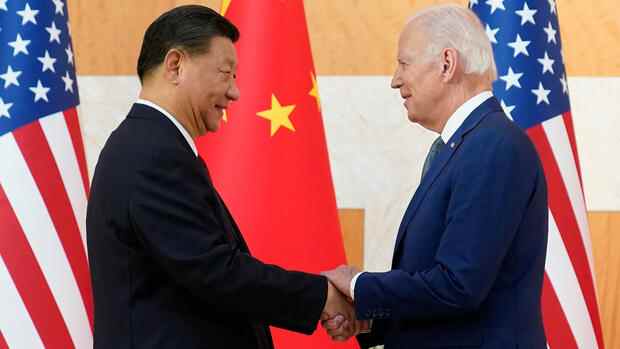There have been worse weeks for the world community: In the USA, the democratically minded and moderate forces sent a sign of life by letting the fanatical candidates of the Trump camp fail in the meantime in rows. A democratic normality that has long since ceased to be a matter of course in the leading Western power.
In Ukraine, warlord Vladimir Putin suffered setbacks: in Cherson, as in Kharkiv, the Ukrainian troops gave the lie to those who believed that successful offensives against the Russian invaders were impossible.
The message of all three meetings: It still exists, the willingness to talk between democratically minded and autocratically led states. The multilateral approach still exists, albeit in a rudimentary form. And above all: they still exist, the common interests that make compromises possible in the first place.
Top jobs of the day
Find the best jobs now and
be notified by email.
War fatigue is spreading around the world, and Putin can no longer be sure of his allies. Ergo: Putin is increasingly isolated.
Diplomatic channels are open again
This is not a consensus on which a new, fundamental world order could be built. But it is one that at least reopens the diplomatic channels – no more, but also no less.
>> Read also: The G20 achieved a surprising amount in Bali – also thanks to Olaf Scholz
The speechlessness that recently prevailed, especially between the rival world powers China and the USA, has been overcome, at least temporarily. This development is based on a new consensus, the consequences of which should not be underestimated: Nobody can see themselves as the winners of Russia’s imperialist war.
Not China, which initially calculated that it had a strategic advantage in that this war could, firstly, weaken the West and, secondly, above all divide it. Neither of these things happened, at least not to the extent expected. Not India, which, like China, initially benefited from cheap energy imports from Russia, but increasingly fears the longer-term economic consequences of this war.
Not the majority of developing and emerging countries, which initially did not want to be exploited by either the US or China camps, but are now suffering from soaring food and energy prices and a strong dollar. The gains in the global safe haven currency are making it more difficult for the emerging countries, which are still heavily indebted in dollars, to service their debts.
Nuclear threats are anything but conducive to the business climate
Overall, the world has come to realize that Putin’s nuclear threats are anything but conducive to the business climate in an already severely weakened global economy. This applies by far not only to Europe, which is experiencing a veritable energy emergency and which, along with Russia and, of course, Ukraine, is without a doubt the main victim of this war.
Putin’s war leads to a chaotic reorganization of the world energy markets – with serious and sometimes unpredictable consequences for many industries and entire economies. With this war, the regime in Moscow wanted to impose a new world order on the rest of the world: Multilateral rules should no longer prevail, but only the law of the strongest, or more precisely: of the more violent. With this war, Putin wanted to force the rest of the world to take sides.
Putin is now the lonely one
In fact, as the most recent summits show, he has now succeeded. However, not as intended: Putin is now the lonely one. While Beijing isn’t turning its back on Moscow entirely, the signals – particularly on Putin’s nuclear threat – are surprisingly clear.
Of course, all this does not mean that the G20 could develop into a kind of world government. This is and remains unrealistic in a situation in which both the USA and China are in an epochal duel for world domination and want to decouple from each other.
Alone in front of the TV.
(Photo: IMAGO/SNA)
The fragmentation trend of the global economy is intact. But anyone who wants to counter this trend – and that is undoubtedly in Europe’s economic and political interests – should revive formats such as the G20.
Because a dialogue between industrialized and emerging countries, no matter how difficult it may be, is still better than any soliloquy of the G7 states, whose weight in the global economy will decrease rapidly.
The pessimist may object: summit declarations are nothing but words. They may be judged by their deeds, the summit participants. That’s true too. But overcoming the speechlessness is the prerequisite for the compromise that makes such deeds possible. And sure: there will be worse weeks again.
More: Joe Biden makes a serious mistake – and Xi becomes a star in Asia
